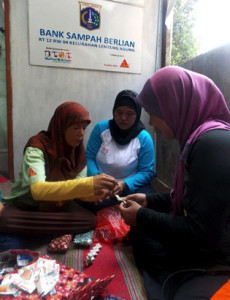The need for improved solid waste management is plainly obvious in slum communities where narrow unstructured homes are crowded with trash and bad odors. We work with community members to Reduce, Reuse, Recycle, and Re-Green, as well as teaching them skills to enable them to use waste as a resource. Through awareness events, campaigning and educational activities, community members are beginning to see the benefits of properly managing their solid waste. In 2012 for example, Cadres in three locations (Teluk Gong, Pulo Kandang and Utan Kayu Selatan) collaborated with 31 local vendors in campaigning to residents and buyers to bring their own bags, which resulted in reducing each vendor’s purchase of new plastic bags by ½ – 1 pack every two weeks.
 “I am happy to get a chance to be a cadre and get recycled-product training from Yayasan Tirta Lestari. I got benefited not only related to waste management but also improving my skill on making recycled-product. I can also share my skill to friends in other neighborhood. In average i got additional income of 150.000 Rupiah ($11 USD)/month from the recycled product, such as wallet, bag and pot that I made. I can use these money for buying foods and other daily needs. I really expects there will be more woman coming to waste bank site and learn about how to make recycled products. Thus, not only we create more clean environment, but also making friends and increase family’ income.” —Ibu Nurhasimi (pictured in the green shirt), Lenteng Agung community
“I am happy to get a chance to be a cadre and get recycled-product training from Yayasan Tirta Lestari. I got benefited not only related to waste management but also improving my skill on making recycled-product. I can also share my skill to friends in other neighborhood. In average i got additional income of 150.000 Rupiah ($11 USD)/month from the recycled product, such as wallet, bag and pot that I made. I can use these money for buying foods and other daily needs. I really expects there will be more woman coming to waste bank site and learn about how to make recycled products. Thus, not only we create more clean environment, but also making friends and increase family’ income.” —Ibu Nurhasimi (pictured in the green shirt), Lenteng Agung community
PROPER PRACTICES
Managing solid waste starts with changing behaviors related to purchasing decisions, and includes proper waste handling. Changing behaviors on any account is no quick and easy feat, so we conduct our related projects with a persistent vision to keep your environment clean. Core project activities are reducing waste, anti-littering, and re-greening.
Reducing Waste
Yayasan Tirta Lestari is working with community members to reduce the number of plastic bags, snack wrappers and sachet-size waste. We have a project working with local stall vendors to minimize plastic shopping bags, a Snack Smart project to reduce purchases of processed snacks, and a project to promote buying in bulk to avoid sachet-sized purchases (and save money). Eleven vendors in Teluk Gong collaborated on the Reduce Plastic Bags Project in 2012, and no longer provide plastic shopping bags on Saturdays and Sundays.
Anti-Littering
Littering is prolific and is compounded by the lack of a community collection site and trash pick-up service. Most people litter their trash wherever and occasionally sweep it into a pile and burn it. Our team conducts many different awareness activities in collaboration with community groups on the benefits of not littering, and works with local leaders to mobilize improvements to communal solid waste collection. For example, in 2012 with Pulo Kandang, community members refurbished their dumpsite with a large bin depot that approximately 500 households use, which keeps their rubbish from falling or being thrown into the canal during long (sometimes three months) waits between pick-up service.
Re-Greening
Urban slum communities are hard pressed for space to say the least, and do not have access to planting soil. We have been working together to create green spaces wherever possible (sometimes just using hanging plants). We incentivize with sacks of planting soil for those who produce compost, keep their plants well and environment litter-free. We worked with a cluster of five families in Utan Kayu Selatan in 2012 for example, whom pooled together to dedicate and rehabilitate 9 m2 of land previously used for dumping waste and toileting into a beautiful mini garden.
WASTE AS A RESOURCE
Though the scavenger communities see the direct value of the inorganic portion of waste, the organic and non-recyclable inorganic portion is not commonly seen as a resource. Yayasan Tirta Lestari is going to great lengths to raise awareness and teach community members benefits of composting and producing recycled products. Catalyst events such as Earth Day celebrated with Teluk Gong Community in 2011, generated solid waste management project interest with more than 240 people (15% of population).
Composting
Since household organic rubbish is not regarded as a valuable commodity, it is commonly tossed out. This organic litter is not only smelly and unsightly but also attracts rodents that increase vectors of disease. Yayasan Tirta Lestari works with community members to show them how to separate their organic waste to make compost. 15% households (roughly 60 households) in Teluk Gong harvested more than 100 kgs of fine compost in 2011 that was used for planting for greening.
Recycled Products
Yayasan Tirta Lestari engages community members to collect, select and clean plastic waste which cannot be sold as such though can be used to produce marketable products. Project participants are trained how to sew plastic waste into different products as well as on basic business skills. Community members in Tanjung Priok and Pulo Kandang have collected and separated unsellable flexible plastic waste from their surroundings, such as plastic package material of cracker snacks, coffee and detergent packs, and made more than 2,000 marketable products.
